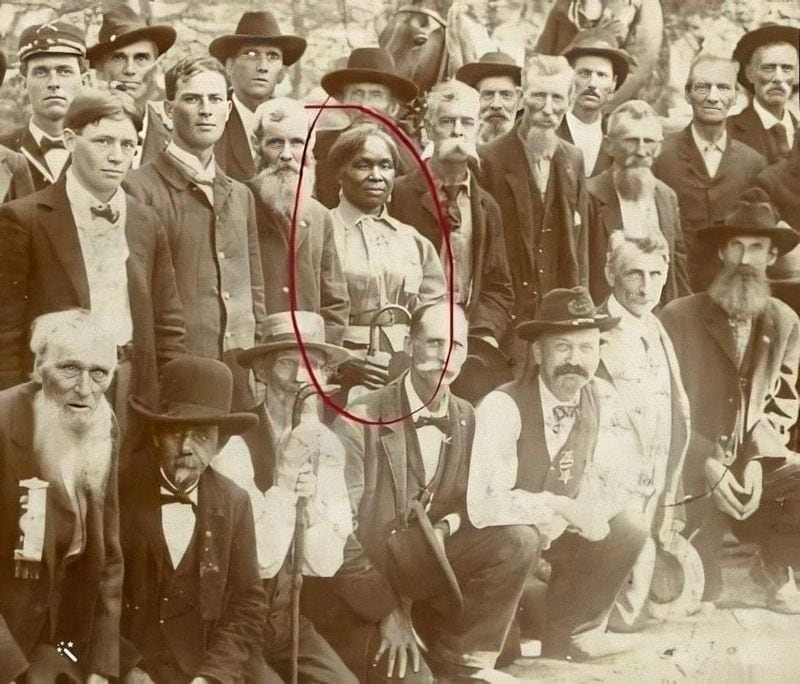“The Beavercreek purpose was a pair hundred thousand {dollars}. We had a stretch purpose as a joke,” she stated. “They’ve reached it. We weren’t going to see 1,000,000 {dollars} in income till later this 12 months, and we already surpassed it.”
Kirkpatrick is the primary proprietor of a vertically-integrated hashish firm in Ohio, certainly one of two Black dispensary house owners in Ohio and the primary Black girl licensed to develop and dispense medical marijuana by the state. A serial entrepreneur, Kirkpatrick can be proprietor and president of the AKA Group, a building agency in Cleveland.
”Vertically built-in” means the marijuana enterprise controls all elements of manufacturing from cultivation to sale. The corporate operates different areas in Athens and Columbus, and a cultivating and processing heart in Ironton that began rising hashish crops in June of final 12 months.
Lucy Higgs Nichols and different veterans of the Indiana twenty third regiment at a reunion in 1898. Higgs escaped slavery and served as a nurse within the Civil Struggle. CONTRIBUTED

Lucy Higgs Nichols and different veterans of the Indiana twenty third regiment at a reunion in 1898. Higgs escaped slavery and served as a nurse within the Civil Struggle. CONTRIBUTED
Harvest is a family-owned and operated enterprise, with over 50% of workers who’re minorities and girls. Kirkpatrick attributes her firm’s success to the stellar customer support her budtenders present.
“I thank God on daily basis that I get to do that,” Kirkpatrick stated. “We will put individuals ready to do that legally, to be in management positions, to study agriculture. We’re about medicinal practices. That is an sincere occupation.”
Harvest was granted a license from the Ohio Board of Pharmacy as a part of a state initiative supporting “economically deprived” teams within the marijuana enterprise. The intent was to offer minorities, specifically Black-owned companies, a leg up within the business.
Black-owned small companies usually face extra hurdles in getting capital because of a wide range of elements together with the racial wealth hole, lack of collateral for loans, and sometimes fewer banking relationships. Minority entrepreneurs additionally usually have fewer enterprise contacts and fewer entry to info on how you can navigate authorized and monetary methods.
“I don’t suppose everyone seems to be leaving us purposely out of the narrative. I don’t suppose we’ve been inspired to ask what the outlying story is,” Kirkpatrick stated. “Once I purchased this constructing, I didn’t know providers that have been on the market for enterprise: providers, grants, free power audits. The one providers I knew about earlier than have been how you can get entry to welfare. The information I had entry to was how you can keep poor.”
Kirkpatrick has confronted discrimination in her work. The Harvest location in Columbus was vandalized with racial slurs. Kirkpatrick has been denied participation in applications as a result of there wasn’t a “variety requirement.”
“Individuals inform me to get out of this enterprise. It’s virtually an on a regular basis prevalence: refined issues, refined racism. Typically it makes you sick towards your self, like ‘Am I actually speculated to be right here?’” Kirkpatrick stated. “I can’t surrender. I cannot promote out, as a result of if I surrender, we’re going to have that very same image of that very same nurse 100 years from now.”
An estimated 19% of Black American households, roughly 3.5 million households, have a unfavorable web price, in response to a research by McKinsey & Firm, attributed to discriminatory insurance policies which have hindered their accumulation of wealth over time. Kirkpatrick’s enterprise mannequin seeks to reverse this by encouraging workers to tackle management roles and serving to younger individuals.
“Focusing your life on solely making a buck belittles you. You need to hitch your wagon to one thing larger than your self,” she stated.
















